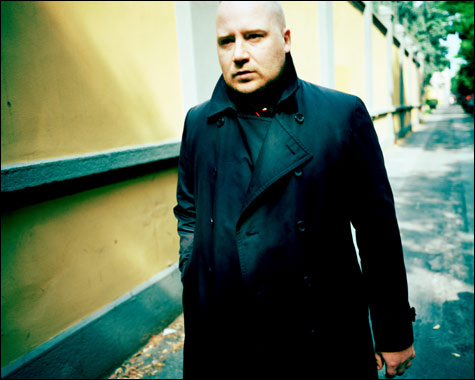
WINNING LOSERS "There's a beauty in failure," says Jóhann Jóhannsson, "and it's this heroic failure that I'm interested in." |
"The word utopia itself means a non-place. The word itself means it can never exist."
It's another gross, rainy afternoon in Boston, and I'm on the phone to Copenhagen with Icelandic composer Jóhann Jóhannsson talking about failure and despair. Great. Maybe I just had weird assumptions about Icelanders, but I expected we'd proceed on jollier terms — I was, after all, still rocking goosebumps from a fresh pass through Fordlândia, his most recent suite of compositions for 4AD. Had I the coffee in me to draw parallels between the personality of the composer and that of his works, I might have known enough to be patient and let the mood lift of its own accord — and of course it does.
"There's a beauty to this sort of over-reaching, though," Jóhannsson continues. "It's part of any creative act. There's a beauty in failure. And it's this heroic failure that I'm interested in."
Heroic failures like Fordlândia itself — Henry Ford's ill-fated and short-lived 1928 attempt at a utopian rubber plantation/village stuck into a particularly unfavorable patch of land in the middle of the Amazon rain forest. (Sounded pretty solid, though, right?) The sound of Jóhannsson's Fordlândia is a soaring aerial view of decayed optimism, as overgrown with lush thickets of strings as the ruins are with "the Amazon forest slowly and surely reclaiming" them. But if the music conveys a sense of paradise failed and fading, it also conveys the hope that allowed the dream to fail in the first place.
Jóhannsson is big into cycles. In 2004, he composed Virðulegu Forsetar, an hour-long piece for 11 brass players, a church organ, and assorted electronic drones and percussion that stretches a 12-bar phrase (with pauses) into a gorgeously torturous grinding crawl. In its final 15 minutes, the phrase picks up again — if the piece were left to run continuously, it would describe a perfect (if regularly devastating) loop.
"The decay can be joyous," Jóhannsson insists. And it's hard to deny that when the opening title track delivers you into the album with a five-minute can't-go-on-must-go-on ritardando. (Jóhannsson suspects it's "the longest one on record.") It's stunningly beautiful. Perfect in its obvious and mounting defects, beautiful simply for having tried so hard.
Whereas William Basinki allowed his Disintegration Loops to fall apart in a beautifully harrowing concrète requiem, Jóhannsson's music draws emotional force from his control. And though Fordlândia, and its forerunner in a still-unfinished trilogy, IBM 1401: A User's Manual, both take impossibility as a premise, Jóhannsson's realizations are fueled by a spirit of endless possibility. His IBM suite adopted its melodic themes from music composed by his father on the title dinosaur computer — music that itself was a defect, resulting from a hum that could be modulated by programming the computer's memory a particular way. Just as IBM found him coaxing a symphony from magnetized coils with bad shielding, Fordlândia is Jóhannsson discovering refined beauty in the unforgiving wild.
For his first-ever US appearances (including Saturday's at the Cambridge Y), Fordlândia will be performed by a six-piece ensemble (down from 60), with a string quartet, electronics, piano, organ, and assorted sources like boxes of rocks outfitted with contact mics. "I'm just trying to distill it down to its essence," says Jóhannsson — and though that essence seems more like a tension between diametrically opposed notions of hope and loss, he's not letting semantics run the show. "I'm not a very verbal person — I write instrumental music."
JÓHANN JÓHANNSSON | Cambridge YMCA Theatre, 820 Mass Ave, Cambridge | June 26 at 8 pm | $10 | www.cambridgeymca.org